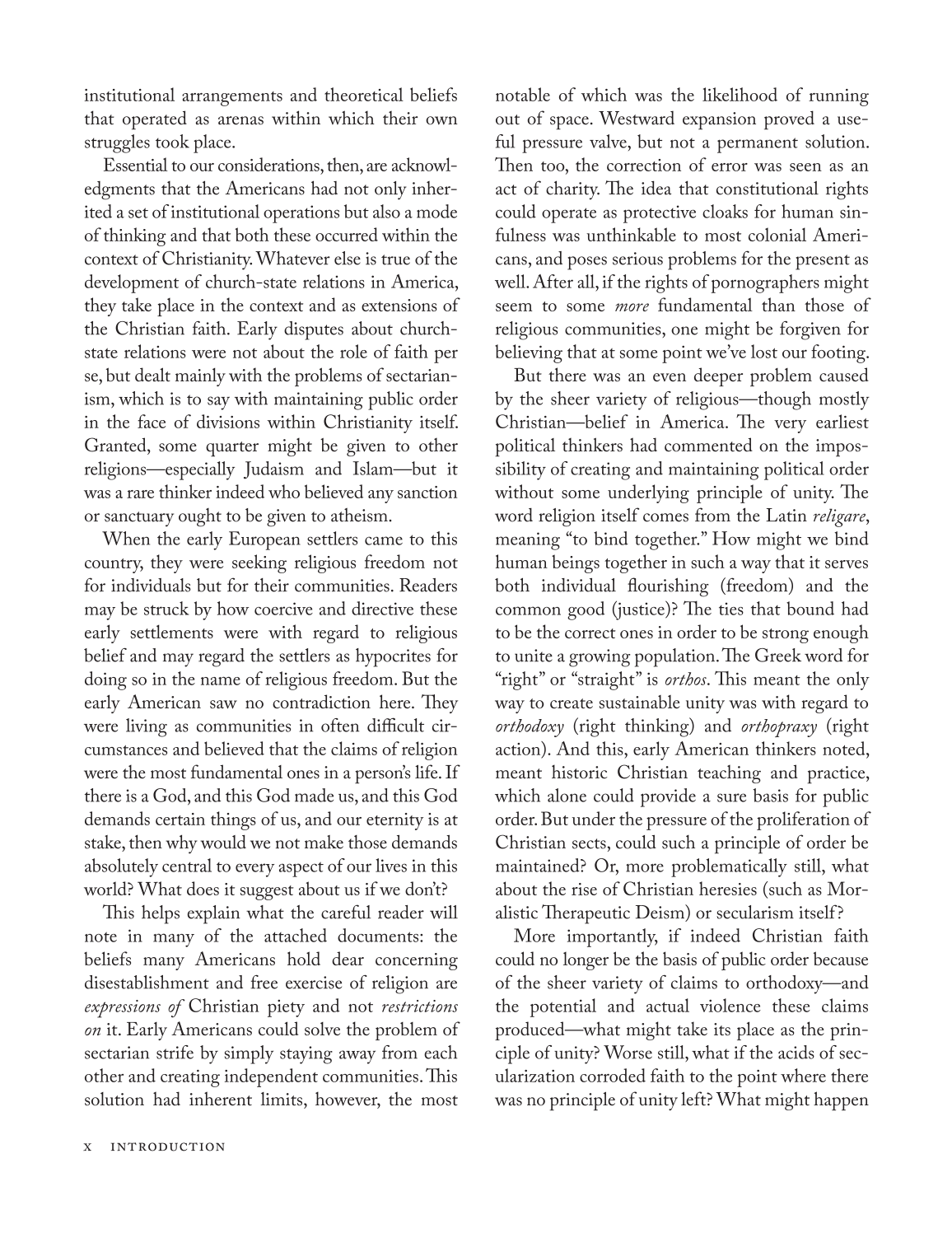x Introduction
institutional arrangements and theoretical beliefs
that operated as arenas within which their own
struggles took place.
Essential to our considerations, then, are acknowl-
edgments that the Americans had not only inher-
ited a set of institutional operations but also a mode
of thinking and that both these occurred within the
context of Christianity. Whatever else is true of the
development of church-state relations in America,
they take place in the context and as extensions of
the Christian faith. Early disputes about church-
state relations were not about the role of faith per
se, but dealt mainly with the problems of sectarian-
ism, which is to say with maintaining public order
in the face of divisions within Christianity itself.
Granted, some quarter might be given to other
religions—especially Judaism and Islam—but it
was a rare thinker indeed who believed any sanction
or sanctuary ought to be given to atheism.
When the early European settlers came to this
country, they were seeking religious freedom not
for individuals but for their communities. Readers
may be struck by how coercive and directive these
early settlements were with regard to religious
belief and may regard the settlers as hypocrites for
doing so in the name of religious freedom. But the
early American saw no contradiction here. They
were living as communities in often difficult cir-
cumstances and believed that the claims of religion
were the most fundamental ones in a person’s life. If
there is a God, and this God made us, and this God
demands certain things of us, and our eternity is at
stake, then why would we not make those demands
absolutely central to every aspect of our lives in this
world? What does it suggest about us if we don’t?
This helps explain what the careful reader will
note in many of the attached documents: the
beliefs many Americans hold dear concerning
disestablishment and free exercise of religion are
expressions of Christian piety and not restrictions
on it. Early Americans could solve the problem of
sectarian strife by simply staying away from each
other and creating independent communities. This
solution had inherent limits, however, the most
notable of which was the likelihood of running
out of space. Westward expansion proved a use-
ful pressure valve, but not a permanent solution.
Then too, the correction of error was seen as an
act of charity. The idea that constitutional rights
could operate as protective cloaks for human sin-
fulness was unthinkable to most colonial Ameri-
cans, and poses serious problems for the present as
well. After all, if the rights of pornographers might
seem to some more fundamental than those of
religious communities, one might be forgiven for
believing that at some point we’ve lost our footing.
But there was an even deeper problem caused
by the sheer variety of religious—though mostly
Christian—belief in America. The very earliest
political thinkers had commented on the impos-
sibility of creating and maintaining political order
without some underlying principle of unity. The
word religion itself comes from the Latin religare,
meaning “to bind together.” How might we bind
human beings together in such a way that it serves
both individual flourishing (freedom) and the
common good (justice)? The ties that bound had
to be the correct ones in order to be strong enough
to unite a growing population. The Greek word for
“right” or “straight” is orthos. This meant the only
way to create sustainable unity was with regard to
orthodoxy (right thinking) and orthopraxy (right
action). And this, early American thinkers noted,
meant historic Christian teaching and practice,
which alone could provide a sure basis for public
order. But under the pressure of the proliferation of
Christian sects, could such a principle of order be
maintained? Or, more problematically still, what
about the rise of Christian heresies (such as Mor-
alistic Therapeutic Deism) or secularism itself?
More importantly, if indeed Christian faith
could no longer be the basis of public order because
of the sheer variety of claims to orthodoxy—and
the potential and actual violence these claims
produced—what might take its place as the prin-
ciple of unity? Worse still, what if the acids of sec-
ularization corroded faith to the point where there
was no principle of unity left? What might happen









































































































































































































































































































